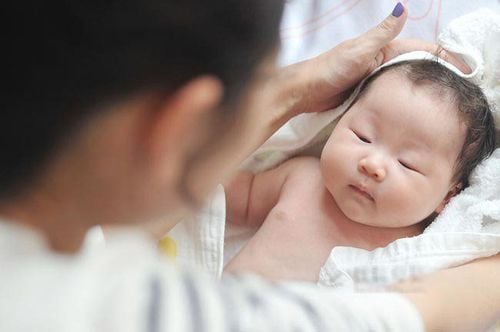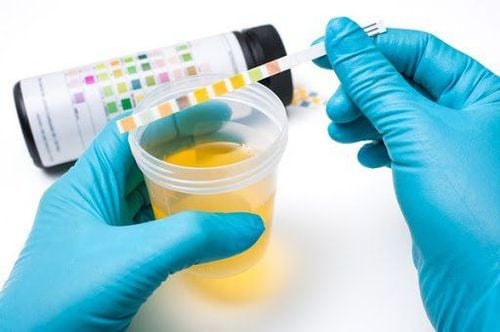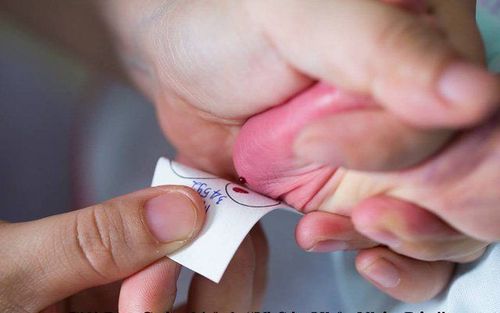This is an automatically translated article.
The article was professionally consulted by Master, Doctor Doan Ngoc Quynh Tram - Department of Pediatrics - Neonatology - Vinmec Nha Trang International General Hospital.The period of 23 months old is a period when children have strong changes not only physically but also in intellectual development and social communication. Therefore, nutrition as well as mental care for children is very important for parents to pay attention to.
1. How does a 23-month-old child develop?
A 23-month-old baby has had a fairly comprehensive development in all aspects such as motor skills, cognitive development, emotional development or social communication.In terms of physical-motor development:
At this stage, children can run steadily and better, start to stand on tiptoes, kick or throw a ball, climb up and down objects in the house proficiently. Especially, children's hand movements are increasingly skillful, can use spoons, chopsticks or other objects in their hands for daily activities Children often like to dance, shout, play with their peers. When taking the stairs, she does not need her mother to hold her hand and can jump up and down the last steps by herself. If you look closely, parents can see that children begin to show ingenuity when building cube towers, building blocks for trains or copying horizontal lines, circles, etc. Intellectual development:
The child's cognitive ability has improved markedly, manifested by the child's recognition of dirty or wet diapers and when they want to go to the bathroom, and their enthusiasm to help their mother in daily activities. . In addition to a budding vocabulary, a baby's memory also thrives during this 23-month-old period. Children can understand object concepts such as remembering their own toys or concepts of time and objects.

Trẻ 23 tháng tuổi thường khó kiềm chế cơn giận
23-month-old babies often have difficulty controlling anger, often have sudden emotional changes and may show some resistance, often get angry easily but can also immediately Back to normal About social skills development:
Children at 23 months of age will become extremely excited when they see other children around. Some bold behaviors may be exhibited, but mainly because children are learning to assert their individuality and independence.
2. What does a 23-month-old baby need to eat?
Parents need to be very careful about building a diet for their child during this 23-month-old period. Nutrient components such as carbohydrates and fats need to make up a large proportion of a child's diet. In addition, to ensure adequate energy supply for children's activities, it is necessary to balance the ratio of protein (animal protein should be more than vegetable protein. help children digest better Fruit juice, yogurt or fresh milk, biscuits are also nutritious foods for children's ageIn general, children should be sure to drink enough 500 ml of milk per day and maintain a diet of 3 main meals and 1-2 snacks. Should consider choosing milk with enough necessary nutrients for children such as DHA, Lutein, Taurine, Calcium and Vitamins to help children develop their brains as well. Mothers should also learn some delicious and nutritious dishes and change the daily menu to help children reduce boredom and encourage children to eat more deliciously.
3. How many teeth does a 23-month-old baby have?

Trẻ suy dinh dưỡng có thể dẫn tới chậm mọc răng
Genetic abnormalities: dental dysplasia, dental development disorders, Down syndrome, hypothyroidism, hypopituitarism, cartilage aplasia Rickets vitamin D resistance Malnutrition, anemia Cysts or tumors in the gums Genetic diseases do not have teeth If the child does not have teeth according to the normal process, parents should not worry because each child's teething is completely different. However, if by the 16th month, the child still has no teeth, it is necessary to take the child to see a pediatrician for advice to find the cause.
When the child has health abnormalities, parents can take the child to Vinmec Health system for timely examination and treatment.
In addition, parents should also apply some methods of changing habits and improving nutrition to support the child's teeth to develop better.
Besides, parents also need to supplement their children with essential micro-minerals such as zinc, lysine, chromium, selenium, vitamin B1, ... to fully meet the nutritional needs of children. The addition of these essential vitamins also supports digestion, enhances nutrient absorption, improves anorexia, and helps children eat well. Parents can simultaneously apply dietary supplements and functional foods derived from nature for easy absorption. The most important thing is that improving your baby's symptoms often takes a long time. Combining many types of functional foods at the same time or changing many types in a short time can make the baby's digestive system unable to adapt and completely not good. Therefore, parents must be really patient with their children and regularly visit the website vimec.com to update useful baby care information.














